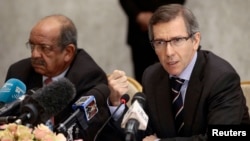Top members of the unofficial government in Tripoli run by Libya Dawn forces say a breakthrough is highly unlikely when U.N.-backed peace negotiations aimed at forming a unity government resume June 7 in Morocco.
Blaming U.N. envoy Bernardino Leon for being secretive and overly optimistic heading into first-round negotiations in Algiers, where talks opened Wednesday, the group says one of the U.N. drafts for a possible agreement contains details it has not agreed to.
Unnamed U.N. officials recently told Reuters that various parties to the negotiations had already agreed on 80 percent of the accord points, a claim that followed comments by Leon describing a Libya on the verge of ceasing to exist as a functioning state, and fast approaching a “moment of truth."
"To not reach an agreement and continue the confrontation is not an option," Leon told politicians and activists gathered for the opening talks in Algiers. "The country is really at its limit."
But the U.N. envoy has been hard-pressed to get the the General National Congress — the parliament that refused to disband to make way for the House of Representatives, which is the legislature elected to replace it — to talk.
Taher Mohammed Makni, an independent member of the GNC, is accusing the U.N. envoy of failing to facilitate transparent negotiations, pointing out that main negotiators for the two rival governments have yet to meet in person.
Libya Dawn's 2014 capture of Tripoli has left the internationally recognized government to operate out of Tobruk, in the east of the country.
"What is highly perplexing is this U.N. body that champions international law, but, in this case, has decided to ignore a Libyan court ruling that decided the House of Representatives is illegitimate," Makni, who serves on the GNC political committee, told VOA via a translator.
The House of Representatives has called the ruling flawed, arguing that the court was pressured to decide the way it did by GNC-aligned militias. The international community has agreed with the House of Representatives.
Both sides in Libya have come under pressure from Western governments to find a way out of the impasse, arguing that while their forces clash in flare-ups across the country, Islamic extremists affiliated with the so-called Islamic State group are gaining ground.
Senior members of Libya Dawn say the solution is quite simple: a national unity government that is formed by both sides.
Abdulgader Hwili, another member of the GNC political committee, says that Western governments are prejudiced against the Tripoli government because they wrongly label it as Islamist. But that is wrong, he insists.
“This is propaganda," he told VOA. "We are Muslim.”
He does not believe the chances are good for a deal next week in Morocco.
“The Libyans should meet together face to face and amend what Mr. Leon produced point by point," he said. "This is the best chance. Otherwise, if the peace negotiations of the United Nations fail, we have a program to meet under the table to make Libyan-to-Libyan peace talks produced by Libyans.”
Some GNC members, including Abd Muhammad Qaid, who serves on the defense committee and is influential with Libya Dawn and in Tripoli as a whole, are more confident.
He says the growth of the Islamic State group's affiliate in Libya is making a deal imperative, and that he has faith negotiations will soon lead to a unity government.
With the holy month of Ramadan starting on June 17 — the official U.N. deadline for talks — time is running out.




